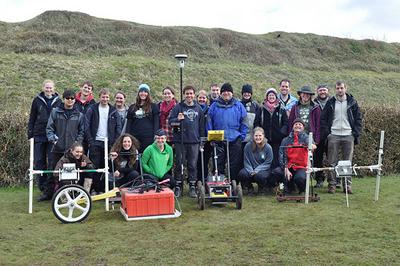Discovering the secrets of Basing House

Third year Archaeology undergraduates have enjoyed getting to grips with fieldwork on land at Basing House near Basingstoke this spring, carrying out standing building and earthwork survey, as well as geophysics.
They learned how to use geophysics equipment such as magnetometers and ground penetrating radar and carried out topographical survey at the site of the Tudor mansion, the ringwork defence and the Civil War earthworks. The results of their work on medieval and Civil War remains will become part of their degree’s final assessment marks.
Student Ole Unhammer from the University of Bergen in Norway chose to spend a semester studying archaeology at the University of Southampton, as part of the European Union’s Erasmus scheme. “I wanted to go to an English university because you take a more practical approach to the subject, at home we concentrate more on theory,” he says. “It was good to learn how to use the geophysics kit to discover the walls of the old structures that pre-date Basing House.”
At its height, Basing House rivalled Hampton Court with five storeys and 360 rooms. Although it was considered the finest private house of its day, it was destroyed during the Civil War by Cromwell’s troops.
More fieldwork is scheduled at Basing later in the year involving postgraduate students.

Links to external websites
The University cannot accept responsibility for external websites.